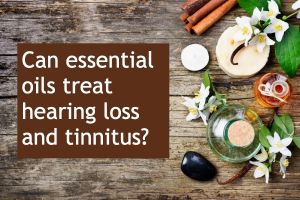Essential oils are concentrated liquids taken from plants, including herbs and fruits. Common essential oils include lemon, peppermint and lavender, but there are dozens, if not hundreds, of essential oils. They’ve been around for centuries, and are frequently used in food and other products to add flavor or a pleasing scent.

Recently, essential oils have seen an uptick in popularity thanks to increased interest in alternative medicine and the simultaneous rise in multi-level marketing companies, such as DoTerra and Young Living, that sell essential oils.
Many online health claims have been made about essential oils, which are not regulated by the FDA. Due to lax regulations in the US, it’s a buyer-beware market—similar to the markets for other popular alternative therapies, such as CBD oil and homeopathy.
Overall, there’s very little clinical evidence that shows medical benefits of essential oils, including for hearing loss, tinnitus, vertigo or ear infections. Be cautious if you use essential oils for any of these health conditions.
Do essential oils work for hearing loss?
Search online, and you’ll find websites claiming that several types of essential oils can help with hearing loss, according to a review of essential oil hearing loss claims compiled by Dr. Robert M. DiSogra, a New Jersey audiologist. For example, he found sites claiming:
- Cajeput oil, geranium oil, lavender oil and tea tree oil could help sensorineural hearing loss, and
- Helichrysum oil could help both conductive hearing loss and sensorineural hearing loss
But is there any evidence these oil will help? No, DiSogra points out in a separate review article on essential oils and hearing loss, tinnitus and vertigo for Audiology Today. This means very little clinical research (if any) has been conducted on these essential oils, and most of the claims are either unfounded or based on people’s self-reports.
“Audiologists should not recommend essential oils for hearing loss,” he said in the article.
Can essential oils help with tinnitus?
Tinnitus is the name for persistent ringing in the ears. DiSogra uncovered unproven claims that the following essential oils could ease tinnitus: cypress oil, ginseng oil, helichrysum oil, juniper oil, lavender oil, lilies oil, olive oil, onion oil, petitgrain oil, rehmannia oil and spotted orchis oil, among others.
Only one of these, lavender oil, was linked to a health benefit in published medical literature, and it was about potential anti-inflammatory effects on the central nervous system, DiSogra found, not tinnitus.
What about CBD (cannabidiol) oil? It’s one of the few oils out there that has been the subject of rigorous research: The FDA has approved a prescription drug made with CBD for severe types of epilepsy, for example. When it comes to tinnitus, we found preliminary-but-conflicting research showing CBD oil may help.
What about essential oils and vertigo?
DiSogra also found plenty of online health claims connected to essential oils and vertigo, including claims about basil oil, bergamot oil, bitter orange oil (neroli), CBD oil, clary sage oil, cypress oil, geranium oil, ginger oil, lavender oil, lemon balm oil, peppermint oil, rose oil, rosemary oil, tangerine oil and thyme oil. None had clinical evidence that they worked.
Is there any evidence that essential oils treat ear infections?
No. As with hearing loss, tinnitus, and vertigo, DiSogra found similar unproven claims being made for essential oils helping with ear infections. These included claims about lavender oil, olive oil, tea tree oil, oregano oil, basil oil, thyme oil, bishop’s weed oil, peppermint oil, mustard oil and a sesame/castor oil mixture.
But when he searched for clinical trials or other medical studies, he found no evidence that any of these oils would help treat an ear infection.
Risks of essential oils
For the most part, essential oils aren’t acutely dangerous and when used cautiously, aren’t likely to cause permanent harm.
At the end of the day, if you’re curious about trying any of these essential oils, you should use them cautiously and know that they can cause problems if used in the wrong way, including skin reactions.
if you’re curious about trying essential oils, use them cautiously and know that they do carry risks.
“For example, cumin oil is safe in food, but can cause the skin to blister,” DiSogra notes. “Certain citrus oils used safely in food can be harmful in cosmetics, particularly when applied to skin exposed to the sun.”
Also, some essential oils can affect hormones and are not safe for pregnant or nursing women. Others may affect the cardiovascular system.
When it come to conditions that affect the ear, some websites he encountered urged people to put oils in their ears.
But, he explained, “[essential oils] should never be placed into the ear canal, as the oil can burn the sensitive mucous membranes found within the ear if it is used undiluted,” DiSogra noted.
Financial harms of essential oils
Last but not least, keep in mind that essential oils may harm your bank account: They can be expensive, particularly for brands that claim to be using only organically, non-GMO products. Because the FDA doesn’t regulate these products, even claims like these about the purity of the product may be false.
If you need hearing care
Despite what you may find online, there’s not much actual evidence to indicate any essential oil will help with hearing issues. It’s possible this will change if researchers decide to study essential oils more closely.
In the meantime, though, there are many proven effective treatments for hearing and balance problems. If you or a loved one needs hearing care, our consumer-reviewed directory of hearing clinics is a good next step.
